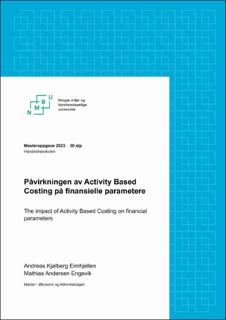| dc.contributor.advisor | Øystein Dahl | |
| dc.contributor.author | Engevik, Mathias Andersen | |
| dc.contributor.author | Eimhjellen, Andreas Kjølberg | |
| dc.date.accessioned | 2023-07-08T16:27:21Z | |
| dc.date.available | 2023-07-08T16:27:21Z | |
| dc.date.issued | 2023 | |
| dc.identifier | no.nmbu:wiseflow:6839595:54592454 | |
| dc.identifier.uri | https://hdl.handle.net/11250/3077305 | |
| dc.description.abstract | Bevarelse av konkurransefortrinn i dagens globale økonomi krever presis informasjon om produktkostnader. Activity-Based Costing (ABC) hevdes å gi bedriftsledere et bedre grunnlag til å ta informerte beslutninger på både operasjonelt og strategisk nivå, og dermed forbedre bedriftens økonomiske resultater over tid. Det er lite empirisk grunnlag for å bedømme om ABC bidrar til forbedret lønnsomhet eller ikke. Formålet med denne studien er derfor å undersøke om det er mulig å finne kvantitativ sammenheng mellom endringer i økonomiske nøkkeltall og bruken av ABC.
I teoridelen tok vi for oss den grunnleggende metodikken ved ABC før vi så på hvordan bruk av ABC-informasjon kan gi grunnlag for bedre strategisk og operasjonell kostnadsledelse. Videre så vi på hvordan ABC kan medføre økt lønnsomhet før vi avsluttet teorikapittelet med svakheter og fallgruver ved ABC. Denne studien ble gjennomført med en kvantitativ tilnærming, med data som ble innhentet fra eksperter og konsulenter fra fagområdet. Det ble innhentet 286 selskaper som har benyttet ABC, men det endelige utvalget endte på 67 selskaper grunnet selektering. Utvalget inkluderte 20 land og 5 bransjer.
ABC-selskapenes prestasjon ble målt mot en kontrollgruppe med like selskaps-karakteristikker. I analysen ble det gjennomgått deskriptiv statistikk og regresjonsanalyser. Analysen ga grunnlag for å beholde alternativhypotesen om at ABC har positiv påvirkning på driftsresultatet (α=170, β=131, P=0,0089). Vi fant positive koeffisienter på ABC’s effekt på driftsmargin, egen- og totalkapitalrentabilitet, men måtte beholde nullhypotesen grunnet P-verdier som oversteg signifikanskravet på 5%.
Vi fant også at finansielle tjenester presterte signifikant bedre enn sin kontrollgruppe på egenkapitalrentabilitet (α=-0,591%, β=3,617%, P=0,018). Bransjen for produksjon presterte signifikant bedre enn sin kontrollgruppe på driftsresultat (α=135, β=169, P=0,0425). Svært mye av variansen på avhengig variabel skyldtes andre forhold enn ABC, noe vi så ved gjennomgående lave R-verdier. | |
| dc.description.abstract | Preserving competitive advantage in today's global economy requires accurate information about product costs. Activity-Based Costing (ABC) is claimed to provide business leaders with a better basis for making informed decisions at both the operational and strategic levels, thereby improving the company's financial performance over time. There is little empirical evidence to judge whether ABC contributes to improved profitability or not. The purpose of this study is therefore to investigate whether it is possible to find a quantitative relationship between changes in financial indicators and the use of ABC.
In the theoretical section, we first discussed the fundamental methodology of ABC before we looked at how the use of ABC information can provide a basis for better strategic and operational cost management. Furthermore, we examined how ABC can lead to increased profitability before concluding the theoretical chapter with weaknesses and pitfalls of ABC. This study was conducted with a quantitative approach, with data obtained from experts and consultants in the field. 286 companies that have used ABC were obtained, but the final sample consisted of 67 companies due to selection. The sample included 20 countries and 5 industries.
The performance of ABC companies was measured against a control group with similar company characteristics. The analysis included descriptive statistics and regression analysis. The analysis provided a basis for retaining the alternative hypothesis that ABC has a positive impact on operating income (α=170, β=131, P=0.0089). We found positive coefficients on the effect of ABC on operating margin, return on equity and return on assets, but had to retain the null hypothesis due to P-values that exceeded the significance level of 5%.
We also found that financial services performed significantly better than their control group on return on equity (α=-0.591%, β=3.617%, P=0.018). The production industry performed significantly better than its control group on operating income (α=135, β=169, P=0.0425). Much of the variance in the dependent variable was due to factors other than ABC, which we saw in consistently low R-values. | |
| dc.language | nob | |
| dc.publisher | Norwegian University of Life Sciences | |
| dc.title | Påvirkningen av Activity Based Costing på finansielle parametere | |
| dc.type | Master thesis | |
